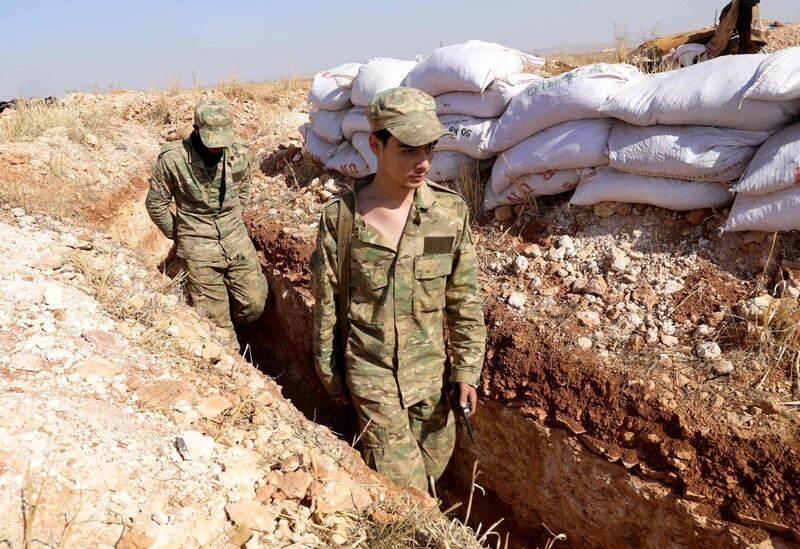A deadline passed on Monday without extremists leaving a planned buffer zone around Syria’s last major rebel bastion of Idlib as set out under a Russian-Turkish deal.
The radical fighters were supposed to withdraw as a final condition to implementing a deal and stave off a regime offensive on the north-western region of Idlib.
The accord hung in the balance on the early hours of Monday, seven years into a grinding civil war that has killed more than 360,000 people and displaced millions.
Just hours before the cut-off time, Idlib’s dominant jihadist vowed to continue to fight but did not give a clear position on the deal reached in the Russia resort of Sochi.
_______________
Read more:
Syrian rebels fire shells from Idlib buffer zone
Syria's Idlib deal deadline approaches as most heavy weapons withdrawn
Bashar Al Assad says Russia-Turkey Idlib deal is ‘temporary’
_______________
"We have not abandoned our choice of jihad and fighting towards implementing our blessed revolution," said Hayat Tahrir Al Sham, an alliance formed by Al Qaeda's former Syrian affiliate.
“We appreciate the efforts of all those who strive inside and abroad to protect the liberated area,” it said in an apparent reference to Turkey.
“But at the same time, we warn of the deceitfulness of the Russian occupier,” it said of the regime’s ally.
Under the accord, heavy weapons were meant to have been withdrawn from the horseshoe-shaped buffer by October 10 and radical fighters were supposed to leave.
The Syrian Observatory for Human Rights said it had not observed any fighters leaving the outlined demilitarised area as midnight struck.
And deadly mortar rounds fired late on Saturday from the planned buffer, according to the Britain-based monitor, appeared to indicate the first part of the deal was not fully implemented either.
“The jihadists not withdrawing gives the regime and Russia an excuse to carry out a military operation at least within the demilitarised zone,” Observatory head Rami Abdel Rahman said.
HTS had likely “tried to gain time by neither explicitly refusing nor accepting the deal” between Russia and Turkey, he said.
Sam Heller, an analyst at the International Crisis Group, on Twitter said the HTS announcement appeared to be a “tacit agreement of the Sochi deal”.
“HTS emphasises its responsibility and flexibility (within limits), which seemingly adds up to a tacit acceptance of the Sochi deal,” he wrote.
Late on Saturday, “heavy mortar shells” were fired from the planned buffer area into regime territory, killing two soldiers, the Observatory said.
Rebels and jihadists had reportedly fulfilled the first part of the deal, with Turkish officials, armed factions and the Observatory reporting that the area was free of heavy duty weaponry.
But it was unclear which groups fired the mortars, it said, as both the Turkish-backed National Liberation Front and rival jihadist factions were present in the area.
The NLF – which holds just under half of the Idlib region and has welcomed the accord – did not immediately respond to AFP’s request for comment on the shelling.
The lion’s share of Idlib is held by HTS, as well as more hardline jihadists like Hurras Al Deen and Ansar Al Islam.
Those fighters also control more than two-thirds of the planned buffer zone and are supposed to withdraw by Monday.
Hurras Al Deen has rejected the agreement, although it apparently withdrew its heavy arms from the area last week.
HTS, widely considered the most powerful force in Idlib, had quietly abided by the deal’s first deadline and re-stationed heavy arms elsewhere.
But getting them to agree to the second part of the deal has proven more difficult.
In a recent report for the Turkey-based Omran Center, expert Nawar Oliver described HTS’s approval as the deal’s ultimate “test”.
“If HTS acts as a spoiler to the agreement on the ground, this will probably lead to one of two scenarios: either Turkey and the NLF launch military action against HTS, or Russia will seize the opportunity with the support of the regime and its allies to enter Idlib,” he said.
“The ramifications of that move could be vast,” he added.
Syrian president Bashar Al Assad and other top government officials have warned that the Idlib deal was only a “temporary” measure.
On Friday, residents around Idlib received warning messages on their mobile phones from the Syrian army.
“Get away from the fighters. Their fate is sealed and near,” one said.





